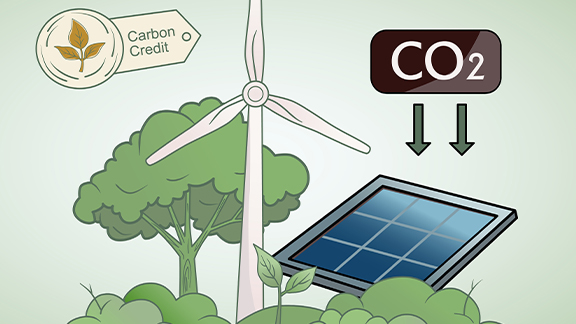A carbon credit refers to the right obtained from reducing greenhouse gas or carbon dioxide emissions into the environment (other greenhouse gases are usually measured in terms of their carbon dioxide equivalent). This includes carbon sequestration or absorption through various activities or projects. These rights must be certified by an accredited body in accordance with governmental or internationally comparable standards. In Thailand, the Thailand Greenhouse Gas Management Organization (TGO), a public organization under the Ministry of Natural Resources and Environment, is responsible for analyzing, screening, and certifying carbon credit projects.
How the Carbon Credit Market Operates in Thailand?

Currently, the carbon credit market can be divided into two main types: the Compliance Market and the Voluntary Market. Each market has different objectives and target groups, yet both play crucial roles in helping reduce greenhouse gas emissions and promoting sustainable development. The carbon credit market in Thailand includes both compliance and voluntary markets:
- Compliance Market: While not as developed as in other countries, Thailand’s compliance market applies to sectors and industries that are required to meet emissions reduction targets. These include large emitters in energy-intensive industries, who may purchase carbon credits to comply with national targets.
- Voluntary Market: The voluntary market allows businesses and individuals to purchase carbon credits to offset their emissions. Many corporations in Thailand participate in the voluntary carbon credit market to meet sustainability goals and improve their environmental credentials. This market is particularly popular among companies that wish to align with Thailand's
Certification Standards in Thailand
TGO has established standards and programs to verify and certify carbon credit projects in Thailand. Key programs include:
- Thailand Voluntary Emission Reduction Program (T-VER): T-VER is a voluntary carbon offset program developed by TGO. It certifies projects that reduce or remove greenhouse gases, allowing them to earn and sell carbon credits. T-VER projects must meet specific requirements to ensure that emission reductions are real, measurable, and verifiable.
- Carbon Offsetting and Reduction Scheme for International Aviation (CORSIA): For airlines operating in Thailand, CORSIA provides a mechanism to offset emissions from international flights. TGO supports CORSIA compliance through the certification of eligible carbon offset projects.




